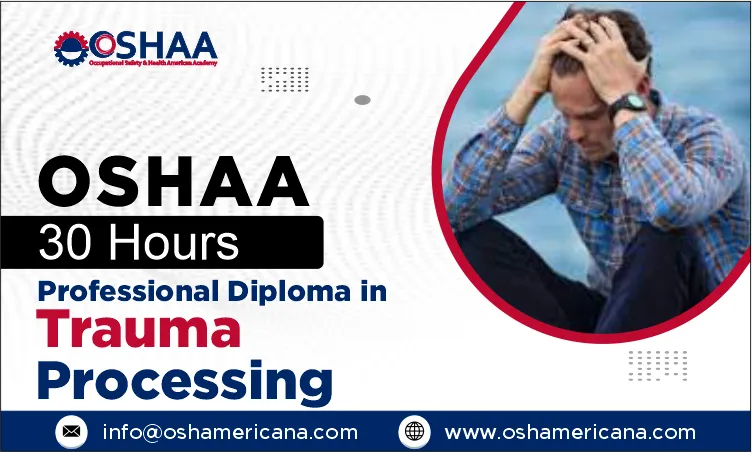Trauma can have a profound impact on individuals, affecting their emotional, psychological, and physical well-being. The OSHAA 30-Hours Professional Diploma in Trauma Processing provides comprehensive training for professionals who support individuals dealing with trauma. This programme offers a structured approach to understanding trauma, its effects, and evidence-based strategies for processing and recovery.
Trauma processing involves recognising, addressing, and managing the emotional and psychological impact of distressing experiences. This diploma explores trauma from a clinical, social, and psychological perspective, equipping participants with the necessary skills to support individuals through their healing journey. The course covers essential theories, intervention techniques, and ethical considerations to ensure best practices in trauma care.
The OSHAA 30-Hours Professional Diploma in Trauma Processing is an essential qualification for professionals dedicated to supporting trauma survivors. With a strong emphasis on trauma-informed care, ethical responsibility, and practical intervention skills, this course provides participants with the necessary tools to make a meaningful impact in the lives of those affected by trauma. By completing this programme, individuals will gain valuable insights and professional expertise to enhance their career prospects while contributing to a compassionate and supportive community.
OSHAA 30-Hours Professional Diploma in Trauma Processing
Study Units
Learning Outcomes
Introduction to Trauma and Its Psychological Impact (3 Hours)
- Understand the definition and scope of trauma
- Recognise the psychological and emotional effects of trauma
- Identify common responses to traumatic experiences
- Develop awareness of trauma’s impact on different age groups and communities
Types of Trauma: Acute, Chronic, and Complex (4 Hours)
- Differentiate between acute, chronic, and complex trauma
- Recognise the causes and consequences of each trauma type
- Identify symptoms and behavioural patterns associated with different trauma types
- Learn appropriate intervention strategies for each trauma category
Neurobiology of Trauma and the Stress Response (4 Hours)
- Understand how trauma affects brain function and development
- Recognise the role of the nervous system in trauma responses
- Identify the physiological changes caused by traumatic stress
- Learn how neurobiological insights inform trauma recovery strategies
Trauma-Informed Care and Best Practices (5 Hours)
- Understand the principles of trauma-informed care
- Learn best practices for creating a safe and supportive environment
- Identify strategies for reducing retraumatisation in professional settings
- Develop skills for integrating trauma-informed approaches into practice
Psychological Theories and Models of Trauma Processing (4 Hours)
- Explore key psychological theories related to trauma recovery
- Understand the role of cognitive, behavioural, and psychodynamic models in trauma care
- Learn about post-traumatic growth and resilience-building frameworks
- Analyse case studies to apply theoretical models in real-world scenarios
Coping Mechanisms, Emotional Regulation, and Resilience (3 Hours)
- Identify effective coping strategies for trauma survivors
- Understand the importance of emotional regulation in trauma recovery
- Develop techniques to build resilience in individuals affected by trauma
- Learn how mindfulness, therapy, and self-care support trauma healing
Communication Strategies for Supporting Trauma Survivors (3 Hours)
- Develop active listening and empathetic communication skills
- Understand the importance of non-verbal communication in trauma care
- Learn best practices for handling disclosures of trauma sensitively
- Recognise communication barriers and how to overcome them
Ethical and Professional Considerations in Trauma Work (4 Hours)
- Understand ethical responsibilities in trauma intervention
- Recognise confidentiality and data protection obligations
- Learn how to manage professional boundaries in trauma work
- Identify the role of self-care and supervision in preventing burnout
Comprehensive Understanding of Trauma
Provides in-depth knowledge of trauma types, neurobiological impacts, and psychological effects, enhancing professional expertise in trauma care.
Enhanced Trauma-Informed Care Skills
Equips participants with best practices for creating safe, supportive environments that minimise retraumatisation and promote healing.
Improved Communication and Intervention Techniques
Develops skills in active listening, empathetic communication, and crisis intervention to effectively support trauma survivors.
Practical Application of Psychological Theories
Applies evidence-based models and frameworks to real-world trauma cases, enhancing problem-solving and decision-making abilities.
Increased Professional Competence and Ethical Awareness
Provides a strong foundation in ethical considerations, confidentiality, and professional boundaries in trauma work.
Stronger Coping and Resilience-Building Strategies
Teaches effective methods for emotional regulation, stress management, and resilience development for both professionals and trauma survivors.
Career Advancement Opportunities
Enhances employability in social care, mental health, counselling, healthcare, education, law enforcement, and community support services.
Multi-Disciplinary Relevance
Suitable for professionals from various sectors, ensuring broader career applications and professional versatility.
Contribution to Community and Societal Well-Being
Empowers participants to make a meaningful impact by supporting individuals, families, and communities affected by trauma.
Internationally Recognised Qualification
Strengthens credentials for career progression, professional development, and specialized trauma-related roles in different fields.
Mental Health and Counselling Professionals
Ideal for psychologists, therapists, and counsellors supporting individuals with trauma-related conditions.
Social Workers and Support Workers
Essential for professionals working in community services, child protection, and victim support roles.
Healthcare Professionals
Beneficial for doctors, nurses, paramedics, and rehabilitation specialists dealing with trauma patients.
First Responders and Emergency Personnel
Relevant for police officers, firefighters, and crisis response teams who encounter trauma cases in their line of duty.
Educators and School Staff
Useful for teachers, school counsellors, and administrators handling students affected by trauma.
Human Resource and Workplace Well-being Officers
Recommended for HR professionals managing workplace mental health, crisis intervention, and employee support services.
Legal and Law Enforcement Professionals
Important for solicitors, legal advisors, and law enforcement officers dealing with trauma victims in legal proceedings.
Community and Charity Workers
Beneficial for individuals working in non-profits, NGOs, and humanitarian organisations providing trauma support.
Foster Carers and Family Support Workers
Suitable for professionals assisting children and families who have experienced trauma.
Anyone Seeking Personal or Professional Development
Valuable for individuals interested in learning trauma processing techniques for career growth or personal understanding.







